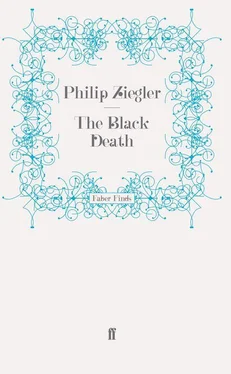As consecrated ground there was not in extent sufficient to provide tombs for the vast multitude of corpses which day and night, and almost every hour, were brought in eager haste to the churches for interment, least of all, if ancient custom were to be observed and a separate resting-place assigned to each, they dug for each graveyard, as soon as it was full, a huge trench in which they laid the corpses as they arrived by hundreds at a time, piling them up as merchandise is stowed in the hold of a ship, tier upon tier, each covered with a little earth, until the trench would hold no more. But I spare to rehearse with minute particularity each of the woes that came upon our city, and say in brief that, harsh as was the tenor of her fortunes, the surrounding country knew no mitigation; for there – not to speak of the castles, each, as it were a little city in itself – in sequestered villages, or on the open champaign, by the wayside, on the farm, in the homestead; the poor, hapless husbandmen and their families, forlorn of physician’s care or servants’ tendance, perished day and night alike, not as men but rather as beasts. Wherefore they too, like the citizens, abandoned all rule of life, all habit of industry, all counsel of prudence; nay, one and all, as if expecting each day to be their last, not merely ceased to aid Nature to yield her fruit in due season of their beasts and their lands and their past labours, but left no means unused, which ingenuity could devise, to waste their accumulated store; denying shelter to their oxen, asses, sheep, goats, pigs, fowls, nay even to their dogs, man’s most faithful companions, and driving them out into the fields to roam at large amid the unsheaved, nay unreaped corn…
But enough of the country! What need we add but (reverting to the city) that… it is believed without any manner of doubt, between March and the ensuing July, upwards of a hundred thousand human beings lost their lives within the walls of the city of Florence, which before the deadly visitation would not have been supposed to contain so many people! How many grand palaces, how many stately homes, how many splendid residences, once full of retainers, of lords, of ladies, were now left desolate of all, even to the meanest servant! How many families of historic fame, of vast ancestral domains and wealth proverbial, found now no scion to continue the succession! How many brave men, how many fair ladies, how many gallant youths, whom any physician, were he Galen, Hippocrates or Aesculapius himself, would have pronounced in the soundest of health, broke fast with their kinsfolk, comrades and friends in the morning, and when evening came, supped with their forefathers in the other world!
Boccaccio used this description as the preamble to his Decameron ; a stark background against which he was to create a miracle of light and vivid fantasy. It is only reasonable to consider whether, in the interests of dramatic contrast, he did not portray the Black Death in Florence in even gloomier colours than it deserved. Certainly he was not anxious to stress the happier side: the selfless devotion of certain nuns or doctors, the efforts of the city government to keep going some sort of order and administration. Certainly, too, few cities suffered as much as Florence. But so much of Boccaccio’s detail is to be found in the records of contemporary chroniclers in France, Germany and England as well as Italy, that no one can doubt its essential truth.
The headlong flight from the cities, abandoning possessions and leaving houses open to all the world; the ruthless desertion of the sick, to meet their end as best they might, with no company but their own; the hurried, sordid burials in great communal pits; crops wasting in the fields and cattle wandering untended over the countryside – such details are the common currency of the chroniclers. On some points, even, it seems that Boccaccio does not do full justice to the horror: other reports, for instance, give more attention to the sinister role of the becchini , {82} 82 14 e.g. Cronica Fiorentina, Muratori, 30, 1, p. 231.
brutalized monsters, their life not worth twenty-four hours’ purchase, who would force their way into the houses of the living and tear them away to join the dead unless the men paid for their safety with a handsome bribe or the women with their virtue.
In its picturesque detail, therefore, one must accept Boccaccio’s account as accurate and authentic. But the same cannot be said for his statistics. His estimate of a hundred thousand dead within the city is patently exaggerated. By 1345 the population of Florence was already declining from its zenith of some fifty years before. The evidence of the number of bread tickets issued in April 1347 suggests a population of well over ninety thousand {83} 83 15 Giovanni Villani, Cronica, op. cit., Book II, p. 122.
and the most authoritative modern estimate similarly puts it at between eighty-five and ninety-five thousand, with a slight preference for the higher figure. {84} 84 16 E. Fiumi, ‘La demografia fiorentina nelle pagine di Giovanni Villani’, Archivio Storico Italiano, 1950, Vol. I, p. 80.
Unless Florence was virtually unique it seems impossible that more than two thirds and unlikely that much more than half of these can have died during the six months of the plague. In the much smaller but in many ways comparable cities of San Gimignano, Siena and Orvieto, analysis of the available data suggests a death rate of about 58 per cent in the first {85} 85 17 E. Fiumi, La popolazione… volterrano sangimignanese, p. 280.
and 50 per cent (or a little more) in the others. {86} 86 18 W. M. Bowsky, ‘The Impact of the Black Death upon Sienese Government and Society’, Speculum, Vol. XXXIX, No. 1, 1964, p.18. Carpentier, op. cit., p. 135.
One could not be far wrong if one guessed that between forty-five and sixty-five thousand Florentines died of the Black Death.
Boccaccio’s estimate, though extravagant, was not wholly fantastical. It is noteworthy, too, that he qualified it with some surprise that the population of the city should have turned out to be so much greater than had been generally believed. In this he was more cautious than many of his contemporaries who manipulated or invented statistics with almost inconceivable levity. Dr Coulton has referred to the ‘chronic and intentional vagueness’ of the medieval mind when confronted by a set of figures and quotes as an example the action of the English parliament which, in 1371, fixed the level of a tax on the basis that there were some forty thousand parishes in the kingdom, while, in fact, the most cursory study of readily available records would have shown that there were less than nine thousand. {87} 87 19 Black Death, p. 28.
Partly this may have been due to the intractability of Roman numerals for complicated multiplication or division but there seems too to have been genuine indifference to the need for, indeed the very possibility of, precision. A large figure was a picturesque adornment to an argument but not part of the basic data from which a conclusion was drawn. It might be expressed as though exactly calculated but this was merely so as to heighten the dramatic effect. When the Pope was assured by his advisers that the Black Death had cost the lives of 42,836,486 thoughout the world, or the losses in Germany were estimated at 1,244,434, {88} 88 20 Nohl, op. cit., pp.6 and 26.
what was meant was that an awful lot of people had died.
The estimates of chroniclers are not always so nonsensical. When the Chronicler of Este {89} 89 21 Chronicon Estense, Muratori, 15, III, p. 162.
said that, in and around Naples, sixty-three thousand people were killed by the plague in two months, the figure was high but not impossible. It is again unlikely that the Chronicler of Bolgona was right in saying that three out of every five people died {90} 90 22 Cronica Gestorum ac factorum memorabilium civitatis Bononie, Muratori 28, II, p. 43.
but there are contemporary historians who maintain that in certain Italian cities the mortality rate was in the region of 60 per cent. {91} 91 23 e.g. A Doren, Storia Economica dell’ Italia nel Medio Evo, Padua, 1937, p. 579.
But, right or wrong, neither of these writers was convinced of or even particularly concerned about the literal accuracy of his figures; the estimate was an expression in vivid and easily remembered form of the enormity of his experience. The material for an even slightly accurate census did not exist and the contemporary scholar, extrapolating from a few verified facts, is more likely to arrive at a sensible answer than the medieval chronicler dependent on his own eyes and a vivid imagination and convinced, anyway, that the matter was one of trivial importance.
Читать дальше












